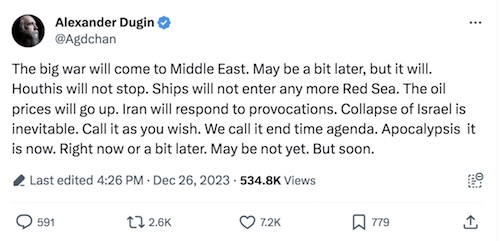
Edward Hopper New York restaurant 1922





1947
In 1947, French science fiction writer René Barjavel was asked for a prediction of the future. He imagined a future with cell phones-like portable TVs and electronic communication in the film La télévision, œil de demainpic.twitter.com/vkU7PZI4Cx
— Massimo (@Rainmaker1973) December 26, 2023



Chris Farley
In 1995 the republicans celebrated their first 100 days of being in the majority by having Chris Farley address them as Speaker Gingrich. Apparently politics used to be fun pic.twitter.com/E4vKwajUqk
— Fred (@Grand_handsomer) December 26, 2023




“We are in the fight of our lives to save our country from madness and doom.”
• ‘Rot In Hell’ Biden – Trump Christmas Greeting (RT)
Former US President Donald Trump has posted Christmas greetings wishing eternal damnation on his political enemies and ranting about their alleged efforts to interfere in the 2024 election by blocking voters from returning him to power. Trump’s series of holiday messages on Monday reached a crescendo with a post wishing a merry Christmas to US President Joe Biden, federal prosecutor Jack Smith and world leaders, “both good and bad.” He concluded, “May they rot in hell. Again, merry Christmas.” Trump referred to his successor as “Crooked Joe Biden” and said Smith was the current president’s “only hope” to win reelection in 2024. Smith is prosecuting Trump in two criminal cases – alleging mishandling of classified documents and trying to overturn Biden’s 2020 election victory – and is trying to win convictions before voters go to the polls next November.
Referring to the US Department of Justice (DOJ) special counsel as an “out-of-control lunatic,” Trump claimed that Smith’s recent hiring of outside lawyers was an “unprecedented” move that aimed to “help him with his poorly executed witch hunt.” He went on to say that “the thugs we have inside our country” are trying to destroy the US through such measures as open borders, high inflation, high taxes, “woke military,” and Biden’s handling of Israel-Iran tensions and the Russia-Ukraine conflict. The ex-president lamented in another post that it was difficult for him to have a “truly great” Christmas as he faced “a crooked and incompetent president who wants to put his political opponent in jail.” He added, “We are in the fight of our lives to save our country from madness and doom.”
Trump also predicted that 2024 will “go down as the year of great and fully coordinated illegal election interference” by Biden, the DOJ, the FBI and politically motivated prosecutors around the country. In addition to the two federal cases, he faces criminal indictments on state charges in Georgia and New York. “But despite it all, in the end, there will be a big and glorious victory for those brave and valiant patriots who want to make America great again,” he said. “Merry Christmas to all!” Trump issued a more traditional holiday greeting on Sunday, wishing Americans a merry Christmas. He acknowledged the birth of Jesus Christ as the reason for the celebration and alluded to the 2024 election by referring to the “pivotal” year ahead. “May 2024 be the best year of our lives,” he concluded.
The former president has made a tradition of scathing holiday messages, such as a Thanksgiving greeting in which he blasted Biden and aired his legal grievances. His Christmas post last year called out “radical left Marxists,” the “lamestream media,” the DOJ and the FBI.


“..the continued existence of a politicized [intelligence community] that will cause problems for years to come — long after Trump has left the political scene..”
• Obama Shaped CIA To Boost His Political Agenda – Former Agent (JTN)
Former CIA agent John Gentry said that the CIA became politicized under the Obama administration with the hiring of Democratic activists who shifted the intelligence agency leftward. Gentry, a Georgetown University adjunct professor who served in the CIA from 1978 to 1990, details the agency’s political changes in his new book, “Neutering the CIA: Why U.S. Intelligence Versus Trump Has Long-Term Consequences.” The politicization of the non-partisan agency first became an issue in the 1990s under CIA analyst Robert Gates, who later went on to become defense secretary for both George W. Bush and Barack Obama, Gentry says. At the time, Gates ordered reports to be skewed to support elected officials’ political narratives, according to The Washington Times.
Obama and his appointees “made and institutionalized significant changes, largely by creating new structures, policies, and incentives designed to alter organizational cultures in ways congruent with Obama’s political agenda,” Gentry wrote. He said that Democratic activists hired by Obama “shifted leftward the collective, politically salient worldview of the intelligence bureaucracy.” Gentry also calls the CIA a “center of partisan political activity.” This shift was illustrated in the 2016 election, with the most prominent example occurring with the embrace of the since discredited Christopher Steele dossier. “While activists tried hard to keep observers’ focus on Trump and his exceptionalism, the preponderance of evidence points strongly to the continued existence of a politicized [intelligence community] that will cause problems for years to come — long after Trump has left the political scene,” Gentry said.

“..would overturn the long-standing Justice Department policy to avoid even the appearance of trying to influence elections..”
• The Supreme Court Holds to Regular Order for the New Year (Turley)
The decision on Friday by the U.S. Supreme Court to deny a motion for expedited appeal is not ordinarily a matter for exhaustive media coverage. However, if the Trump name appears in the caption of a case, many legal experts suddenly jettison all due process concerns or sense of restraint. That is particularly true when the denial could — as here — prove highly beneficial to Donald Trump. The denial very likely ends the effort by Justice Department special counsel Jack Smith to put Trump on trial just before the March 5 Super Tuesday primary elections, and it could well result in a trial after next November’s general election. Smith was able to get D.C. District Court Judge Tanya Chutkan to shoehorn the trial into a small window in March 2024. At the time, some of us stated that we were skeptical whether Smith could hold to that date in light of the novel constitutional and evidentiary issues in the case.
Even with the expedited review of the D.C. Circuit appellate court with an oral argument scheduled for Jan. 9, it will take time to issue an opinion. Trump then has a right to seek review with the full court in an en banc petition. That could easily take weeks, even on an expedited basis. It would then have to be appealed to the Supreme Court for a full briefing and argument. That schedule would likely approach or pass the March date. Assuming Smith prevails in every review, the pretrial proceedings still would have to resume after the case is returned to Judge Chutkan. That could easily push any potential trial to within 60 days of the general election — a period in which the Justice Department has historically avoided prosecutions under a long-standing policy to prevent influencing elections.
Ironically, Judge Chutkan ruled against Trump on immunity and the scheduling by insisting that he should be treated no differently from ordinary citizens. That is precisely what the Supreme Court just did. It refused to take away an appeal that most ordinary defendants could expect from the courts. Once the Court’s rejection became known on Friday, the coverage was full of anger and accusations. Before the ruling, many legal experts praised Smith and supported the effort to cut short Trump’s right to appeal. Just a day before the Court’s decision to turn down Smith, legal expert Dave Aronberg declared on MSNBC that “the Supreme Court seems to be willing to hopscotch over the appellate court. Jack Smith is calling Trump’s bluff.” It did not exactly work out that way.
Although the justices’ actual vote on the motion is not known, commentators immediately declared that conservatives on the Court had rendered a politically calculated opinion to spare Trump. A typical take appeared on Vox, where senior correspondent Ian Millhiser referred to “the GOP-controlled Supreme Court” and that three justices are Trump appointees, in order to paint the decision as nothing more than a rigged process. The decision, however, stuck with the regular order of appeals used for defendants. The extraordinary act would have been for the Supreme Court to allow Smith to bypass the court of appeals for no other reason than his insistence that the case is hugely important.
It is clear, of course, that the case is important — but the question is why such weighty issues should be given less judicial scrutiny due to that importance. A full appeal can produce concessions or admissions by a party in the course of arguing the issues. It creates a full appellate record that is considered by the Supreme Court, along with the trial record. So far, just one judge has ruled on this matter. The D.C. Circuit adds at least three — and potentially more — appellate judges as part of the standard review process.
If anything, Smith has an advantage before the D.C. Circuit. Notably, while two of the three judges were appointed by President Joe Biden, much of the media does not refer to the panel as “Democratic-controlled.”Every defendant is entitled to due process, including a full opportunity of appellate review absent a set of narrow, expedient circumstances. This was not one of those. Smith never actually explained why the trial is so urgent that the defendant should be denied one of two courts for appellate review. The assumption is that Smith’s urgency is to convict Trump before the 2024 election for the benefit of voters. That, of course, would overturn the long-standing Justice Department policy to avoid even the appearance of trying to influence elections.

“The way out of this impasse lies in Israel reinventing itself. But the near civil war conditions in the country won’t permit that to happen.”
• India’s Turnaround On Palestine Has More Than Meets The Eye (Bhadrakumar)
Indian diplomacy is ending 2023 with a momentous turnaround. What began as a course correction necessitated by the torrential flow of events in West Asia is assuming strategic overtones. Truly, the aberration in India’s policies can be traced to the UPA rule (2004-2014) but it is under the period since then 2014 that they accentuated phenomenally and began creating contradictions undermining national interests. This aberration also led to a serious erosion of India’s strategic autonomy in a transformative international environment. India’s voting pattern in the United Nations with regard to the Israel-Palestine conflict is lately marked by a calibrated distancing from Israel. Only a few weeks ago, Israel’s ambassador in Delhi bullishly described the Indian stance as one of “100% support” to his country. But that is no more the case today.
Delhi has rejected the repeated Israeli entreaties to declare Hamas as a terrorist organisation, marking its independent opinion regarding the ecosystem of resistance movements. Indeed, this is a highly significant distinction that Delhi is making vis-a-vis the Israeli and Western narrative about Hamas. although India has not hesitated to condemn the violence directed against Israel on October 7, it refused to name Hamas. Considering that Hamas had a chequered past of receiving patronage from Israel, Tel Aviv has no right to expect Delhi to dance to its tunes. Equally, Hamas’ future is far from an open and shut case. The fact that Sinn Fein and Irish opinion has shown empathy towards Hamas, or that South Africa, which has itself been a victim of apartheid, has recalled its ambassador and diplomatic mission to Israel, calling the horrific Gaza killings as “genocide,” go to show that the embers of national liberation struggle are still burning.
Although India expressed “solidarity” with the Israeli people over the brutal violence on October 7, it cannot condone the vastly disproportionate Israeli retaliation since then, blithely calling it a matter of Israel’s ‘right to self-defence’. On December 13, India voted in favour of a resolution in the UN General Assembly that demanded an immediate humanitarian ceasefire in the Israel-Hamas conflict. This was the first time India supported such a resolution since the war broke out more than two months ago. Such a stance puts India on the right side of history, as the 193-member UNGA overwhelmingly adopted the resolution at an emergency special session, with 153 nations voting in its favour. A third aspect is that from a geopolitical perspective, Delhi has marked its distance from the US-Israeli campaign branding Iran as the instigator of extremist groups acting against Israel.
Interestingly, on December 19, India was one of only thirty states — along with Russia and China — who voted against a UN resolution on “the human rights situation in Iran.” The running thread here is that India has reverted to its traditional stance on the Palestine problem and jettisoned the tilt supportive of Israeli interests. The unprecedented unity among the Arab countries, the close coordination between Saudi Arabia and Iran, the huge groundswell of opinion in the Arab world against Israeli atrocities against the Palestinian populations in Gaza and West Bank — all this has created a new momentum in Middle East politics that has pitchforked the Palestine problem to the centre stage, which is something India cannot afford to ignore. Nor can Delhi be oblivious of the new reality that something has fundamentally changed in the dynamics of the Palestine problem after the events since October 7.
The Israeli ploys of dissimulation and evasiveness and deliberate wrecking of dialogue process and negotiations may no longer work. Indeed, Israel’s overwhelming military superiority vis-a-vis its Arab neighbours has lost its relevance. Coupled with the US’ loss of influence and America’s waning global hegemony alongside the sharp polarisation of opinion within Israel itself internally add up to create grave uncertainties regarding the future of the state of Israel as it exists today. Suffice to say, India feels the need to adapt to the new conditions in West Asia where regional countries prefer to settle their issues by themselves, which in turn undermines the rationale behind the creation of Israel as a cockpit of western strategic interests. The way out of this impasse lies in Israel reinventing itself. But the near civil war conditions in the country won’t permit that to happen.

Maksim Oreshkin is not a public figure. But when he appears, pay attention. He’s labeled a “Putin aide”, but he’s his no.1 economic adviser. A very influential man.
• US ‘Cannibalizing Europe’ – Oreshkin (RT)
The US insistence on sanctioning Russia has caused a downturn in the EU economy, according to President Vladimir Putin’s top economic adviser, Maksim Oreshkin. In an interview with Expert magazine published on Tuesday, Oreshkin said the sanctions imposed since February last year have caused the EU to lose both its energy security and a key export market. Oreshkin pointed to the key factors underlying the EU’s economic prosperity, outlined by the bloc’s foreign policy chief Josep Borrell. They include easy availability of energy resources from Russia, the use of cheap production in China, and access to the Russian and Chinese markets. “The gradual loss of these factors is leading the EU economy towards long-term stagnation,” Oreshkin argued, “because European manufacturers now have neither the export market nor the advantages in technology that they had five to ten years ago.”
Oreshkin accused the US of “cannibalizing its European partners, killing European chemicals, automotive and other industries.” This comes amid a broader degradation of the West and its economic model, he said. “The economies of the Global North – the US, Japan, the EU – are slowly losing their status, their significance. This gradual decay of the countries of the Global North and the growth of countries in the East and South is what will further shape the landscape of the global economy,” he predicted. Oreshkin noted that China has already become the leading global economic power, while Russia is now the largest economy in Europe, “on course to replace Japan as the world’s fourth largest.”
According to the presidential aide, the world’s key economic players will be focusing their development strategies on growing markets in Asia and Africa in the coming years. Russia’s development will take the same direction, he predicted, especially in the energy sphere. “The stronger the economic growth [in Asia and Africa], the higher will their level of energy consumption be, and the better the energy markets will feel… For Russia, the key task is to remain the most efficient producers of what we make, which includes energy. We must have lower costs, more efficient production, and then the changes that will occur in the energy markets will affect us to a lesser extent.”

“..the so-called economies of the Global North – the United States, Japan, the EU – are gradually losing their role and importance.”
• Russia Now Europe’s Largest Economy – Oreshkin (Sp.)
Russia has become the largest economy in Europe, revealed Russian presidential aide Maxim Oreshkin in an interview with Expert magazine. Globally, he also stated that the Russian economy sits just behind Japan in the race for the fourth-largest economy. According to Oreshkin, “the so-called economies of the Global North – the United States, Japan, the EU – are gradually losing their role and importance.” “China has become the leading economy, Russia is now the largest economy in Europe and is closing in on Japan in the race for fourth rank. Asian economies have moved up significantly in the rankings, with India taking third place, Indonesia moving up to seventh place and poised to challenge Germany’s sixth place in the near future,” Oreshkin said. According to the World Bank, China emerged as the world’s largest economy in purchasing power parity terms in 2022. The United States secured second place, followed by India in third and Japan in fourth. Russia secured fifth place, while Germany remained in sixth.
Back in October, the International Monetary Fund (IMF) revised its 2023 GDP growth forecast for Russia to 2.2% growth compared to the earlier prediction of 1.5% in July. However, the outlook for 2024 has been adjusted downward to 1.1% from 1.3%. The IMF noted “mixed effects” of Western sanctions on Russian crude oil exports in its latest World Economic Outlook. Despite sanctions, Russian export flows remained stable, and crude oil continues trading above the $60 price cap imposed by the G7 countries. Earlier, Russian Minister of Economic Development Maxim Reshetnikov hinted at a 3.5% GDP growth in 2023, but the formal forecast of 2,9% remained unchanged. However, Russian President Vladimir Putin was more optimistic and asserted a minimum 3.5% growth by the year’s end, surpassing the ministry’s official 2.8% forecast for 2023.

May sound crazy, but the reasoning is solid.
• German Car Industry Could Be Sold To China – Oreshkin (RT)
China is rapidly gaining market capitalization in the global automobile sector, while European carmakers are losing competitiveness, Maksim Oreshkin, Russian President Vladimir Putin’s top economic adviser, told Expert magazine in an interview published on Tuesday. Oreshkin noted that China has already become the number one exporter of cars in the world, which does not bode well for European car brands. “I wouldn’t be surprised if companies like Mercedes and BMW fade into history in ten years. As brands they will probably remain, but will follow the fate of Volvo, which was sold to China. In other words, they will actually cease to be European cars,” the presidential aide predicted.
“European manufacturers now have neither the market nor the technological advantage that they had five to ten years ago,” according to Oreshkin. The broader EU, and Germany, its industrial powerhouse, in particular, have been in the grip of an economic crisis for the past year and a half, ever since Brussels launched its sanctions war on Russia in response to the Ukraine conflict. As a result, the bloc lost access to cheap energy from Russia, which used to power much of its industry. Earlier this year, the head of Germany’s Association of the Automotive Industry, Hildegard Muller, warned that the country “is losing dramatically its international competitiveness” as the location for the automobile industry because of soaring energy costs.
China became the world’s largest automobile exporter for the first time in Q1 this year, having sold 1.07 million vehicles and pushing Japan to second place. The country has kept up its lead in the following quarters, with the export volume registering a year-on-year growth of 59.7% in January-October at 3.92 million units, according to data from the China Council for the Promotion of International Trade. Meanwhile, following the departure of European, American, South Korean, and Japanese carmakers due to sanctions, China became Russia’s biggest automobile supplier in 2023. According to the latest available data, Chinese brands accounted for 92% of all Russian car imports between January and August.

The west goes down. The rest does not.
• Russia – China Are on a Roll (Pepe Escobar)
One of the most impressive features of the expanded Russia-China partnership is what is being planned for the Chinese northeastern province of Heilongjiang. The idea is to turn it into an economic, scientific development and national defense mega-hub, centered on the provincial capital Harbin, complete with a new, sprawling Special Economic Zone (SEZ). The key vector is that this mega-hub would also coordinate the development of the immense Russian Far East. This was discussed in detail at the Eastern Economic Forum in Vladivostok last September. In a unique, startling arrangement, the Chinese may be allowed to manage selected latitudes of the Russian Far East for the next 100 years. As Hong Kong-based analyst Thomas Polin detailed, Beijing is budgeting no less than 10 trillion yuan ($1.4 trillion) for the whole thing. Half of it would be absorbed by Harbin.
The blueprint will reach the National People’s Congress next March, and is expected to be approved. It has already been approved by the lower house of the Duma in Moscow. The ramifications are mind-boggling. We would have Harbin elevated to the status of direct-administered city, just like Beijing, Shanghai, Tianjin and Chongqing. And most of all a Sino-Russian Management Committee will be established in Harbin to oversee the whole project. Top flight Chinese universities – including Peking University – would transfer their main campuses to Harbin. The universities of National Defense and National Defense Technology would merge with Harbin Engineering University to form a new entity focused on defense industries. High-tech research institutes and companies in Beijing, Shanghai and Shenzhen would also move to Harbin.
The People’s Bank of China would establish its HQ for northern China in Harbin, complete with markets trading stocks and commodities futures. Residents of Heilongjiang would be allowed to travel back and forth to designated Russian Far East regions without a visa. The new Heilongjiang SEZ would have its own customs area and no import taxes. That’s the same spirit driving BRI connectivity corridors and the International North South Transportation Corridor (INSTC). The underlying rationale is wider Eurasia integration. At the recent Astana Club meeting in Kazakhstan, researcher Damjan Krnjevic-Miskovic, Director of Policy Research at the ADA University in Baku, gave an excellent presentation on connectivity corridors.
He referred for instance to the C5+1 (five Central Asian “stans” plus China) meeting three months ago in Dushanbe joined by Azerbaijan’s president Aliyev: that translates as Central Asia-Caucasus integration. Miskovic is paying due attention to everything that is evolving in what he defines, correctly, as “the Silk Road region” – interlinking the Euro-Atlantic with Asia-Pacific and interconnecting West Asia, South Asia and wider Eurasia. Strategically, of course, that’s the “geopolitical hinge where NATO meets the Shanghai Cooperation Organization (SCO), and where the Belt and Road Initiative (BRI) connects with Turkiye and the territory of the EU.” In practical terms, Russia-China know exactly what needs to be done to propel economic connectivity and “synergistic relationships” all across this vast spectrum.

“We have no real insight into [Chinese] leadership plans and intentions in China at all..”
• CIA Struggling to Tackle ‘Horrendous’ Losses in China Spy Network (Sp.)
The US Central Intelligence Agency (CIA) is struggling to rebuild its damaged spy network in China, unnamed American officials have told the Wall Street Journal (WSJ). According to them, the goal is to restore the CIA’s “human espionage capabilities” in the People’s Republic of China (PRC), where the agency lost its network of agents a decade ago. The sources referred to what they described as Beijing’s spycatchers, who “all but blinded” CIA agents in China at the time, when the officials claimed at least “two dozen assets” providing information to the US had been executed or put behind bars. The officials argued that the US currently faces limited understanding of secret plans by Chinese President Xi Jinping and his associates on key security issues, including those pertaining to Taiwan.
“We have no real insight into [Chinese] leadership plans and intentions in China at all,” the sources claimed. The insiders added that details of what went wrong are not known to the public and it is unclear whether any of the CIA’s employees have been held accountable. One official argued that the agency’s losses in China were “horrendous.” Per the sources, the CIA and other US spy agencies cut spending on counterterrorism and other targets to focus on funding programs to penetrate the Chinese government after 2020. One official made it clear that strengthening the human spy network targeted on China will be a tricky task, saying, “The reality is that you don’t have collection resources that you can exploit all over the world.”
The claims come after CIA Director William Burns said in an interview with the WSJ that China remains at the top of the agency’s to-do list. “We are approaching the PRC as a global priority, more than doubling the budget resources devoted to the China mission over the past three years, and establishing the China Mission Center as CIA’s only single country mission center to coordinate the full agency’s efforts on this issue. Even as we are balancing multiple priorities including ongoing conflicts, we remain intensely engaged on the strategic long-term challenge posed by the PRC,” he said.

“Before it would have endured three days. Now it’s a matter of hours..”
• Germany’s Bundeswehr Not Battleworthy Beyond Several Hours’ Fight (TASS)
The current material and technical condition of Germany’s armed forces, the Bundeswehr, has deteriorated sharply over the past two years, Colonel (Ret.) Ralf Thiele, a retired Bundeswehr officer told the Focus Online publication. “At the beginning of the attack (the start of Russia’s special military operation in Ukraine – TASS), the Bundeswehr was already understaffed. Now it is even worse,” he contends. According to the expert, the German armed forces can only blame themselves for this deplorable state of affairs, as they long delayed needed upgrades. Should Germany or any other NATO country be attacked, the Bundeswehr’s equipment would not last long, Thiele believes. “Before it would have endured three days. Now it’s a matter of hours,” Thiele remarked without elaborating. At the end of February 2022, German Chancellor Olaf Scholz announced the creation of a special 100 bln euro fund specifically for upgrading the Bundeswehr.
The earmarked funds were to be used for investment and armament projects, in particular, the purchase of new equipment, ammunition and machinery. According to German experts, however, no significant improvement in the material and technical base of the country’s armed forces has been achieved yet. In late March, German Defense Minister Boris Pistorius sacked Gabriele Korb, the head of the Federal Office for Defense Technology and Procurement. She had come under criticism for overly long timeframes and overly complex procedures for weapons and equipment procurement. The total amount of German support for Ukraine – including humanitarian, financial and military assistance – has exceeded 25 bln euros since February 2022. In November, it was reported that the German government intended to increase support for Kiev from 4 bln euros to 8 bln euros in 2024. However, the authorities have not yet agreed on the budget for next year due to fiscal problems.

They made people believe they were winning.
• Ukrainian MP Explains Why Kiev Needs 500,000 More Conscripts (RT)
The Ukrainian military needs 500,000 new conscripts to cover casualties and man new units created during the next 12 months, the secretary of Ukraine’s parliamentary national security committee, Roman Kostenko, has said. The lawmaker also warned that eligible Ukrainians would not escape the ongoing mobilization. President Vladimir Zelensky claimed last week that the military leadership had requested the mobilization of “450,000-500,000 individuals” amid the conflict with Russia. Earlier this month, Russian Defense Minister Sergey Shoigu estimated that Kiev had lost more than 383,000 troops, both killed and wounded, since the start of hostilities in February 2022. In an interview with the Ukrinform media outlet published on Monday, Kostenko lamented that his compatriots “thought that we would win soon,” which instilled the belief in Ukrainians that “they could live quietly [and] not prepare for mobilization.”
“And now the words about an additional 450,000-500,000 mobilized have become a cold shower for everyone,” the lawmaker said. He added that the figure roughly reflects the armed forces’ needs in terms of replenishing “sanitary losses during the year” as well as forming new units. The military, according to Kostenko, must plan years ahead as the conflict “can… drag on for a long time.” The national security committee chief added that the Ukrainian government should shift the focus of its information policy from the promise of a quick victory and a vacation in Crimea to a more solemn message that “everyone must protect the Motherland. No one will evade it.”
Several Ukrainian media outlets reported on Monday that the legislation currently being considered by the Verkhovna Rada calls for the conscription age to be lowered from 27 to 25. The draft law is also said to include the introduction of electronic military draft notices, which would be sent via email and other means. According to reports, draft dodgers will be banned from receiving certain benefits and services from the state, obtaining loans, traveling abroad, and carrying out property transactions. MP Vadim Ivchenko told the Strana.ua news outlet that men hiding from mobilization abroad could be denied consular services, including the issuance of new IDs.

“There were firing positions for long-range artillery and MLRS that shelled Donetsk. Now Maryinka is taken and thus the threat was moved away from Donetsk.”
• Why Russian Liberation of Maryinka is So Significant (Sp.)
Russia’s Minister of Defense Sergei Shoigu formally announced that the Russian Armed Forces liberated Maryinka, a heavily fortified city in the Donetsk People’s Republic, which for years served as an important stronghold for the Ukrainian troops, on December 25. Maryinka’s close proximity to the region’s capital of Donetsk allowed Ukrainian forces to shell the bigger city with relative impunity, noted military analyst Anatoliy Matviychuk, a retired colonel of the Russian Armed Forces. “Most importantly, they (Ukrainian forces) turned that city into a fortification,” Matviychuk said. “There were firing positions for long-range artillery and MLRS that shelled Donetsk. Now Maryinka is taken and thus the threat was moved away from Donetsk.”
He further noted that the liberation of Maryinka results in Russian forces taking control of “a hub of railways and highways,” not to mention cutting off the supply lines for the Ukrainian forces in the sector.The Russian victory in Maryinka also means that Ukrainian forces suffered a huge blow to their morale and lost confidence in their ability to hold their positions, suggested Colonel General Georgy Shpak, ex-commander of the Russian Airborne Forces. “Already, as I’ve learned, the number of Ukrainian soldiers who want to end up in Russian captivity has drastically increased,” Shpak said, adding that Kiev troops are becoming disaffected with their leaders and their ideals. Meanwhile, Ret. Col. Rustem Klupov, a military analyst and Russian military intelligence veteran, argued that the liberation of Maryinka was the beginning of a breakthrough in multilayered enemy defense in the sector, which may be followed by further breakthroughs in the Artemovsk and Avdeyevka sectors.
“These three directions – Artemovsk, Maryinka and Avdeyevka – they may lead to a strategic advance towards Pavlograd and Dnepropetrovsk, that’s about 200 kilometers, in order to encircle the enemy attack force that sought to punch through our frontlines in the south,” Klupov said. According to him, such a move by Russian forces would put the entire Ukrainian southern army group at risk as Kiev would be forced to either pull these troops back or risk them being cut off. “The success of this big operation is being determined there, near Avdeyevka and Maryinka,” Klupov claimed. While Kiev’s “counteroffensive” that started early in June and ended without much fanfare by the year’s end failed to produce any results apart from tens of thousands of Ukrainian soldiers killed, Russian forces scored a number of victories in 2023 which include the liberation of the cities of Artemovsk, Soledar and Maryinka.

“Aliens cross the border illegally, test the system, are released into the interior, and then call home to share their experiences. That’s happened millions of times in the past three years.”
• Nearly 250,000 People Flood Southern Border In 1 Month (CS)
U.S. Customs and Border Protection encountered a new record number of illegal border crossers in November as the agency pleaded for help from Congress. Total illegal border crossers encountered along the southwest border in November were 242,418. The majority of apprehensions, 191,113, occurred between ports of entry. CBP agents also processed more than 43,000 people at ports of entry who made appointments through the CBP One App. As part of the administration’s expanded parole program to foreign nationals from specific countries, which Department of Homeland Security Secretary Alejandro Mayorkas announced earlier this year, an unprecedented number of Cubans, Haitians, Nicaraguans and Venezuelans were released into the U.S. who otherwise would not have been allowed in. Early this year, 20 states sued over the program, which they argue is illegal.
The plan initially allowed up to 30,000 Cubans, Haitians, Nicaraguans and Venezuelans to enter the U.S. a month. Since then, that total and the program were expanded. Through the end of November 2023, CBP reports that 297,000 Cubans, Haitians, Nicaraguans, and Venezuelans “arrived lawfully under the parole processes.” More than 62,000 Cubans, more than 120,000 Haitians, more than 54,000 Nicaraguans, and more than 81,000 Venezuelans “were vetted and authorized for travel,” CBP states. They were released into the U.S. CBP also states that more than 60,000 Cubans, 112,000 Haitians, 47,000 Nicaraguans, and 76,000 Venezuelans arrived at the border and were granted parole. CBP processing facilities are currently at capacity along the southwest border in what is projected to be the largest number of illegal entries for the month of December in U.S. history.
In response to the surge at the border, CBP directed more personnel and transportation resources to areas being hard hit in order to transfer illegal foreign nationals “from high traffic areas to locations where they can be efficiently and humanely processed,” it said. “We are screening and vetting every individual we encounter at the border and those without a legal basis to stay are processed for removal,” the statement says. Senior Official Performing the Duties of the Commissioner Troy Miller also said the agency needed more resources from Congress, at a time when Republican Congressional leaders are planning on impeaching Mayorkas in January over the border crisis. “We are facing a serious challenge along the southwest border and CBP and our federal partners need more resources from Congress – as outlined in the supplemental budget request – to enhance border security and America’s national security,” Miller said in a statement.
“Despite ongoing challenges, in November, the men and women of CBP continued their tireless work and recorded increased seizures of illegal narcotics while facilitating lawful trade and increased holiday travel.” U.S. House Homeland Security Committee Chairman Mark Green, R-Tenn., who has vowed to impeach Mayorkas next month, said, “When there is no meaningful consequence applied to illegal activity, that activity will continue – and others will get the message that they can also engage in it with impunity. That’s exactly what has happened at our borders since Secretary Mayorkas took office. Aliens cross the border illegally, test the system, are released into the interior, and then call home to share their experiences. That’s happened millions of times in the past three years.” Green said this will not stop “so long as Secretary Mayorkas doubles down on his refusal to enforce the immigration laws passed by Congress. He must be held accountable.”


“..legitimate major airline boarding passes for migrants that quite literally have the name printed as ‘NO NAME GIVEN.'”
• Gaetz Demands Transparency From Delta CEO About Illegal Immigrants (ET)
Rep. Matt Gaetz (R-Fla.) has raised national security concerns about Delta Air Lines’ role in transporting illegal immigrants from the U.S. southern border into the country’s interior without being “properly vetted.” In a letter to Delta CEO Ed Bastion on Friday, Mr. Gaetz urged transparency regarding arrangements between the airline, federal agencies, and non-governmental organizations (NGOs) facilitating transportation. “It has recently come to my attention that Delta Air Lines is transporting non-resident aliens from the southern border of the United States into the interior of the country,” Mr. Gaetz wrote. “The United States Congress has an interest in understanding pursuant to which arrangements with federal agencies and non-governmental organizations (NGOs) non-resident aliens are able to book and travel on Delta Air Lines flights.”
Sparked by claims in viral social media posts, Mr. Gaetz cited national security concerns around NGOs that receive taxpayer funds buying flights for illegal immigrants who have not been vetted and who seem to be boarding flights without proper identification. These concerns were also put to Department of Homeland Security (DHS) Secretary Alejandro Mayorkas by Sen. Ted Cruz (R-Texas) on Wednesday. Mr. Cruz sought information about the screening procedures for illegal immigrants crossing the border via the U.S. Customs and Border Protection (CBP) “CBP One” app and being helped onto flights to the country’s interior from southern border locations. In his letter to the Delta Air Lines boss, Mr. Gaetz said, “As you are likely aware, certain NGOs receive federal grants, including through the Federal Emergency Management Agency’s Emergency Food and Shelter Program and Shelter and Services Program, making it possible that these NGOs are using federal money to purchase flights for non-resident aliens on Delta Air Lines.”
The Republican congressman echoed Mr. Cruz, saying it was “alarming” that American taxpayers are paying for illegal immigrants to fly around the country from the U.S. southern border who “may not be properly vetted.” “Therefore, I am concerned the Transportation Security Administration (TSA) may be allowing nonresident aliens to board flights, including those operated by Delta Air Lines, with an alternate form of identification that meets a weaker standard than that used to verify the identities of American citizens when they fly,” he added.
Mr. Gaetz sought answers from Ms. Bastion to the following questions:
• How many nonresident aliens has Delta Ait Lines transported on behalf of governmental or nongovernmental organizations since January 20, 2021?
• How do NGOs purchase or reimburse your airlines for the tickets of non-resident aliens?
• Are you now receiving, or have you ever received, any incentive to reimbursement, including money, credit, or other benefits from the federal government, in exchange for the transport of nonresident aliens?
• Has the TSA notified you of what forms of identification are acceptable for nonresident aliens to clear airport security and board your flights? If so, what are they?



Cobalt
The story about this video from the guy who took it. pic.twitter.com/xqzhP997Bf
— @amuse (@amuse) November 29, 2023



Blue magpie
The aerodynamic flight of the red-billed blue magpie
[📹 Birds_clicks2000]pic.twitter.com/UAdQ2rjsNW
— Massimo (@Rainmaker1973) December 26, 2023

Okapi
The okapi has the head of a giraffe, the stripes of a zebra, the body of a horse, a blue tongue long enough to clean its eyes and ears and lives in the wild in a single country in the world. Oh, it's not even 150 years we know about it.
[📹 San Diego Zoo]pic.twitter.com/6rzOc0nZoh
— Massimo (@Rainmaker1973) December 26, 2023


Athens Christmas


Support the Automatic Earth in wartime with Paypal, Bitcoin and Patreon.










